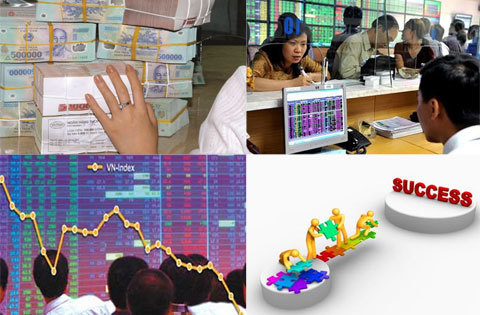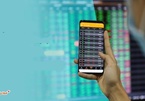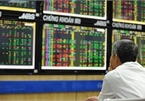
“It’s awful. I am sitting here and watching the electronic board continuously, but I don’t know how negative the VN Index is,” said Nguyen Hung, a securities investor in Hanoi.
“You can’t buy or sell in this situation. Agencies should close the system and suspend trading to avoid losses to investors, and wait for the Government’s intervention,” he added.
This the third consecutive trading session that the stock market has fallen into such a situation. As a result, investors had to buy/sell blind as they did not know whether the market was going up or down.
In the previous trading session, June 8, the stock market witnessed a sharp fall with the VN Index losing nearly 40 points amid strong profit-taking pressure and technical congestion, which made it impossible for investors to cancel or modify orders.
According to a representative of a securities company, profit-taking pressure existed, but it was not strong, because most F0s still could make a profit. He believes that the slide in the market was related to concerns about the lack of transparency and the decision to not allow the canceling or modifying of orders.
An investor from Hoang Mai District in Hanoi said the market has fluctuated wildly. The uncertainties caused him to take a ‘leap in the dark’ by placing market price orders (MP) to escape the current chaos.
Investors have expressed their anger about the stock market chaos on social networks and securities forums.
They said they took a loss, explaining that profit and losses are normal in securities transactions, but they had to buy/sell stocks blindly.
The indexes shown on electronic boards are different in reality. Some investors are concerned if the orders are handled manually. If so, the question about transparency needs to be raised.
The technical congestion has been seen at HOSE (the HCM City Stock Exchange) for many months. Investors at times could not buy or sell stocks as they wanted. The situation became worse in early June. HOSE had to cancel the afternoon session of the first trading session in June.
In an effort to fix the problems, HOSE has asked securities companies to restrict order cancellations and adjustments. This has angered investors even more. They pointed out that this is a violation of the Law on Securities which stipulates that investors are allowed to modify and cancel orders in consecutive order matching sessions.
Who is to blame?
Many investors said they have suffered great losses because of the system problems, which remain unsolved. No and no one has come forward and claimed responsibility for this.
On securities forums, many investors have called on HOSE to stop transactions to avoid losses to investors. They have also called on the State Securities Commission (SSC) and HOSE to take responsibility and give reasonable explanations.
“I cannot understand why the problem has not been fixed for such a long time, since 2020,” Hien, an investor in Hanoi, said.
Many solutions have been applied (raising minimum trading lot, shifting to another bourse, no canceling or modifying orders) but they are just temporary and unreasonable.
“HOSE's image is getting ugly with patchy solutions and excuses,” Hien said.
HOSE’s leaders, in its notices and newspapers, stated that this is a temporary problem and that it has chosen the ‘least worst solution’.
Meanwhile, there has been no clear answer about the exact time when a new system will be put into operation to settle the congestion.
The Vietnam Association of Financial Investors (VAFI) last March said that congestion at HOSE, which had existed for three months, should be blamed on poor administration capability.
It said HOSE still cannot master the operation technology, though it has regulated the system for 20 years.
The weak administrative capability can also be seen in the implementation of the new transaction system. The project kicked off in 2012, but it has not been completed.
VAFI suggested hiring a foreign expert who have many years of experience working for large stock exchanges to work at HOSE as a deputy CEO in charge of information technology (IT).
The association also urged equitizing HOSE and VSD (Vietnam Securities Depository(, which would help upgrade the administrative capability to a regional level.
On securities investors’ forums, many investors have asked HOSE’s managers to resign.
The system used by HOSE was transferred by Thailand 21 years ago. The handling capacity of the system is very low, 900,000 orders per session at maximum, just 1/30 of the capacity of that at HNX (the Hanoi Stock Exchange).
In 2012, HOSE kicked off a project on a new transaction system worth VND600 billion with Korea Exchange (KRX), the contractor. However, the project has been delayed since 2016.
| The stock market is witnessing trading sessions with sharp declines amid technical problems that have gone unresolved for years despite repeated promises from the management agency. |
In the latest news, HOSE has sent a document to securities companies on the trial of a new IT system for the entire stock market (KRX).
From June 11, HOSE will send technical specifications to securities companies. The trial connections will be implemented from June 14 to July 23.
From July 26 to August 6, HOSE will test KRX system functions.
During the two periods of trial, securities companies can connect to the new system from HOSE from 8.30 am to 3 pm on working days.
While waiting for the KRX system to become operational officially, in order to fix the congestion, FPT Corporation, the Vietnamese largest IT firm, has been asked to cooperate with HOSE to adjust the core of the HNX system to connect to HOSE.
The solution has been approved by the Ministry of Finance and SSC. If everything goes smoothly, the new system with the capacity of handling 3-5 million orders a day will be put into operation by early July.
Regarding the system developed by FPT, the corporation last week said it was testing the project on dealing with the HOSE overloading.
The full market testing phase has begun with all securities companies, VSD, HNX and market data recipients. The results of the market-wide testing phase will be the basis for evaluating the system's readiness for official use.
V. Ha

Billions of US dollars flow into Vietnam’s stock market despite Covid-19
The stock market has been witnessing unprecedented cash inflow so far this year, even though the Covid-19 pandemic has become more complicated in Southeast Asia.

Stock market an attractive investment channel for local players
The stock market is still an attractive investment channel for investors in the near future. However, it also poses many challenges for regulators and market members, said experts.